India’s opposition erupts as Amit Shah tables bill to disqualify ministers after 30 days in custody
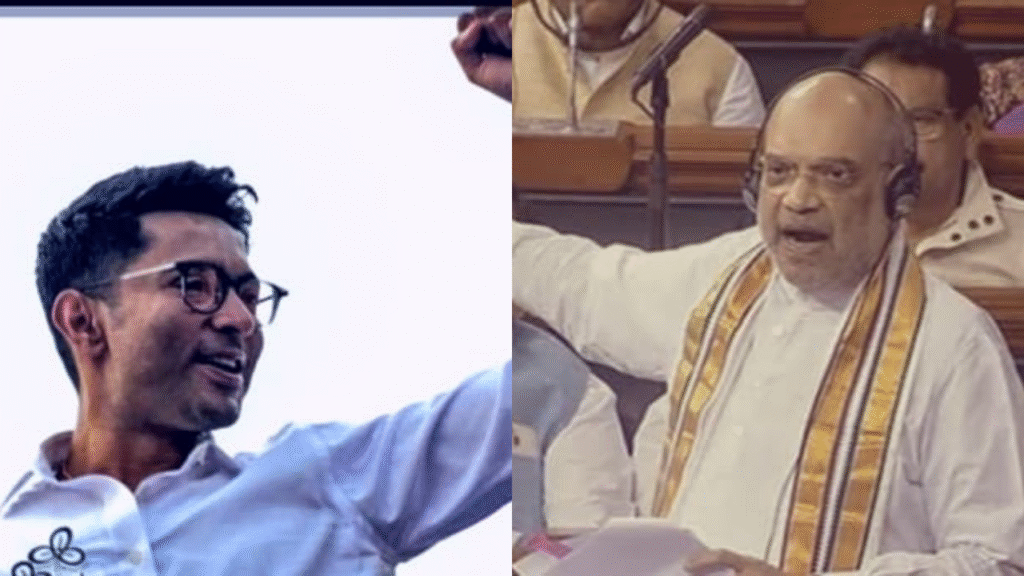
A stormy session rocked India’s Lok Sabha on Wednesday after Home Minister Amit Shah introduced a controversial constitutional amendment bill that would strip the Prime Minister, Chief Ministers, and other ministers of their positions if they remain in custody for 30 consecutive days. The 130th Constitution Amendment Bill, introduced alongside two other pieces of legislation — the Union Territories Government (Amendment) Bill and the Jammu & Kashmir Reorganisation (Amendment) Bill — was met with uproar from the opposition benches. Lawmakers from Congress, Trinamool Congress (TMC), Communist Party of India (Marxist), and All India Majlis-e-Ittehad-ul-Muslimeen (AIMIM) accused the ruling Bharatiya Janata Party (BJP) of weaponising the law to silence dissent. As soon as Shah rose to present the bill, opposition MPs stormed the well of the House, shouting slogans and tearing up copies of the draft legislation. The chaos forced Speaker Om Birla to adjourn proceedings until the afternoon, after which the bill was referred to a joint parliamentary committee. Opposition cries foul Congress MP Priyanka Gandhi strongly criticised the move, calling it “unconstitutional and undemocratic.” “Any Chief Minister can now be kept in custody for 30 days without being convicted, and automatically lose office. This is nothing but a tool to crush democracy under the garb of fighting corruption,” she said. Her remarks come against the backdrop of several high-profile arrests of opposition leaders in recent years, including former Delhi Chief Minister Arvind Kejriwal and Jharkhand’s Hemant Soren, both of whom were detained on graft-related charges. TMC’s Abhishek Banerjee, a vocal critic of the BJP government, accused the Centre of evading accountability while seeking more power. In a statement on social media, he wrote: “The government has failed to protect India’s sovereignty and uplift farmers and workers, but it wants to use agencies like the Enforcement Directorate (ED) to dismantle state governments. This bill reflects an authoritarian mindset.” Banerjee also attacked the Modi government for “hollow bravado” on national security, pointing to its failure to reclaim Pakistan-occupied Kashmir. The Communist Party of India (Marxist) echoed those concerns. General Secretary M.A. Baby described the bill as “neo-fascist,” while Rajya Sabha MP John Brittas warned it would destabilise opposition-ruled states by undermining India’s federal structure. Government defends the bill Rejecting charges of authoritarianism, Shah argued that the draft law would undergo scrutiny by lawmakers across the political spectrum. “The bill will go to a joint parliamentary committee where both ruling and opposition members will be represented,” he said. Despite his assurance, opposition MPs continued their protests inside Parliament, prompting another adjournment. A political flashpoint The proposal comes at a time of heightened political confrontation in India, with the 2026 state elections looming. Critics argue the bill could be used selectively against opposition leaders, enabling the BJP to weaken rival parties by engineering ministerial disqualifications. “This is a direct assault on the Constitution and India’s federal framework,” said AIMIM chief Asaduddin Owaisi, who joined Congress and Left MPs in opposing the measure. Whether the 130th amendment ultimately passes remains uncertain. But for now, it has united an otherwise fragmented opposition bloc against what they describe as the Modi government’s latest attempt to consolidate power.
Kolkata metro expansion to transform city travel ahead of Durga Puja
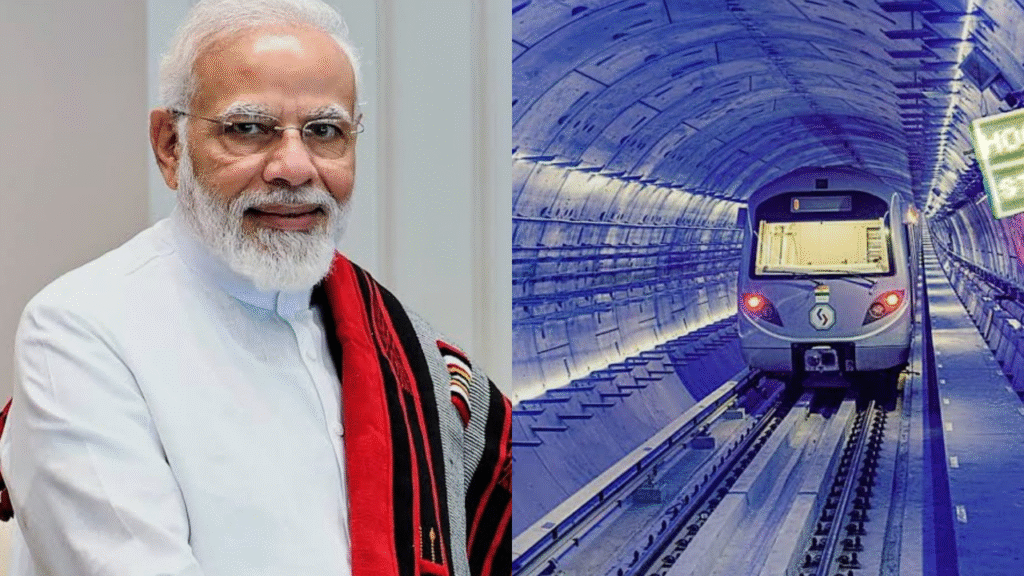
Kolkata is set for a major boost in urban mobility this week, with Prime Minister Narendra Modi scheduled to inaugurate three metro line extensions on Friday, including the long-delayed Sealdah–Esplanade stretch under the East-West Metro corridor, officials said. The 14 km expansion will link key terminals, including Howrah and Sealdah railway stations, the city airport, and Salt Lake Sector V, its information technology hub. Once fully operational, the daily ridership of the East-West Metro could rise from the current 100,000 to more than 700,000, Kolkata Metro General Manager P. Uday Kumar Reddy said. The Sealdah–Esplanade segment, just 2.6 km long, is expected to be the most crucial, cutting travel time between Howrah and Sealdah stations to only 12 minutes via an underwater tunnel under the Hooghly River. The line will ease congestion in the city’s central business district and provide direct access to Salt Lake’s offices from both major railway hubs. For the first time, passengers will also be able to travel between Howrah Maidan and Netaji Subhas Chandra Bose International Airport with a single smart card, though they will need to change trains twice. The Noapara–airport extension, covering 7 km, is also part of the new services. Another 4.4 km stretch connecting Ruby (Hemanta Mukhopadhyay station) and Beleghata (Metropolis) will be launched, offering commuters in eastern Kolkata new links to Sealdah, Howrah and the airport. Services are currently available every 12 to 15 minutes, but the frequency is expected to increase to every eight minutes during peak hours once the expanded network becomes fully operational. Kolkata’s metro, India’s oldest, began operations in 1984. In recent years, several expansions have faced repeated delays, including the East-West project, which was stalled by land subsidence in the Bowbazar area. Last year, Modi inaugurated the country’s first under-river metro service, which opened to the public nine days later. Metro officials said services on the Sealdah–Esplanade stretch may open to passengers immediately after Friday’s inauguration, while the other two extensions are expected to start from Monday.
Delhi CM Rekha Gupta attacked during public hearing, security breach under probe
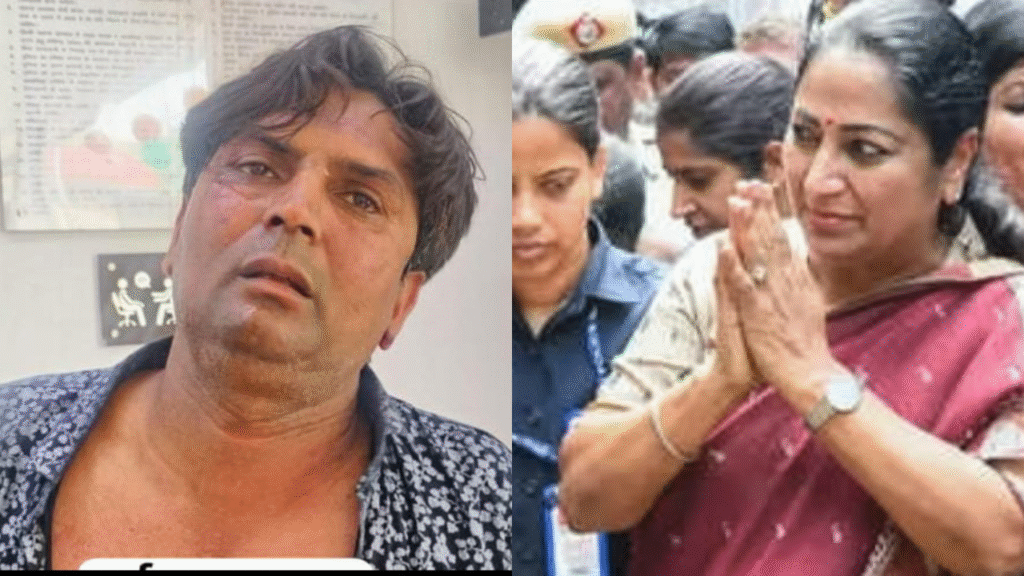
Delhi Chief Minister Rekha Gupta was attacked by a man during a weekly public hearing at her residence on Tuesday, in what police described as a major security breach. The attacker, identified as Rajesh Sakriya from Rajkot in Gujarat, was swiftly overpowered by Gupta’s security personnel and is being questioned, police officials said. Preliminary information suggests he was upset over a Supreme Court ruling to relocate stray dogs in Delhi NCR, according to his family. Gupta, a senior leader of the ruling Bharatiya Janata Party (BJP), was examined by doctors after the incident. Party leaders condemned the attack, with Delhi minister Manjinder Singh Sirsa alleging a “political conspiracy” and calling for a full investigation. “One person present at the meeting attacked the Chief Minister. We condemn the attack. It should be investigated if this attack was politically motivated,” said BJP leader Harish Khurana. Opposition Aam Aadmi Party (AAP) also condemned the assault. “There is no place for violence in a democracy,” said Atishi, AAP’s leader in the Delhi Assembly. “We hope the Chief Minister is completely safe and that strict action is taken against the culprits.” Eyewitnesses said the attacker approached Gupta with papers before suddenly lunging at her. Delhi Police Commissioner S.B.K. Singh will oversee the probe into how the man managed to get close to the Chief Minister. The attack has raised fresh questions about the security arrangements for top political leaders in the capital.
THE BENGAL FILES: “Chilling Fatwa: “Rape Sucheta Kripalani to Earn the Title of Gazi”
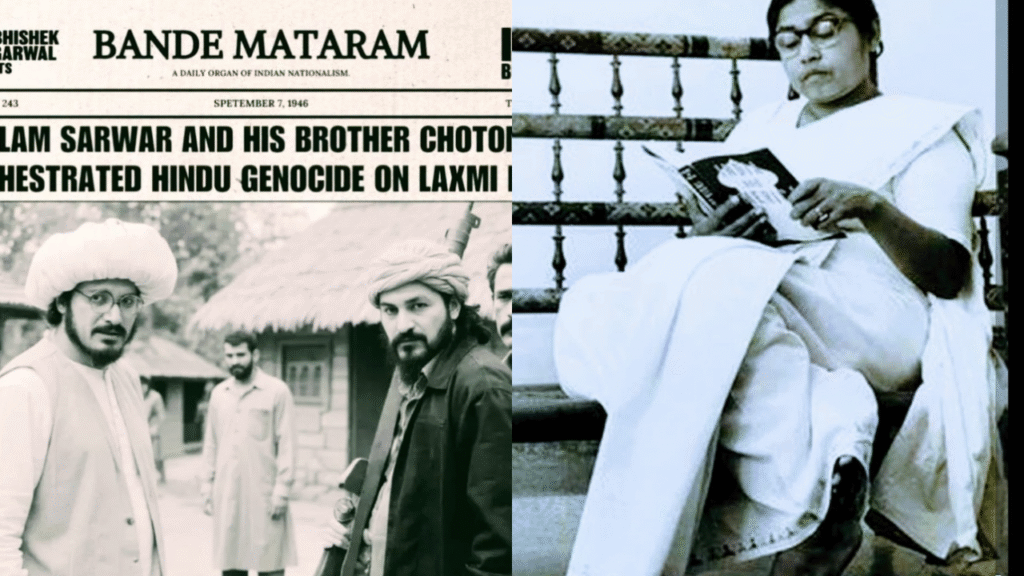
Controversy is mounting in India over filmmaker Vivek Agnihotri’s upcoming movie The Bengal Files, the third in his “Files trilogy”, set for release on September 5. The film revisits the bloody communal violence of 1946 in Bengal and Noakhali, months before Partition. Agnihotri, best known for The Kashmir Files and The Tashkent Files – both of which won national film awards – has launched a fierce social media campaign ahead of the release. In recent weeks, he has shared dozens of posts on X and Facebook, styled as headlines from the period’s nationalist newspaper Bande Mataram. One post, in particular, has provoked outrage. It cites what Agnihotri describes as a chilling fatwa by influential Noakhali cleric Golam Sarwar Husseini: “Whoever rapes Congress leader Sucheta Kripalani will earn the title of Gazi.” Kripalani, then a young protégé of Mahatma Gandhi, was in Noakhali in 1946 as part of a Congress delegation trying to contain the riots. Historians remain divided on the authenticity of such claims, with critics accusing Agnihotri of distorting history for political gain. West Bengal’s ruling Trinamool Congress government has already banned the film’s screening in the state, accusing it of inciting communal tensions ahead of the 2026 state elections. Agnihotri has threatened legal action, while the ruling Bharatiya Janata Party (BJP) at the Centre has openly endorsed the film, calling it a long-suppressed account of Hindu suffering during Partition-era violence. The film has premiered in several US cities and its trailer was released in India on August 16 – the anniversary of the Muslim League’s “Direct Action Day” in 1946, which triggered the Great Calcutta Killings. With supporters hailing it as a bold portrayal of forgotten history and opponents denouncing it as dangerous propaganda, The Bengal Files has already reignited one of South Asia’s most painful and divisive memories.
71 killed as bus catches fire in western Afghanistan crash
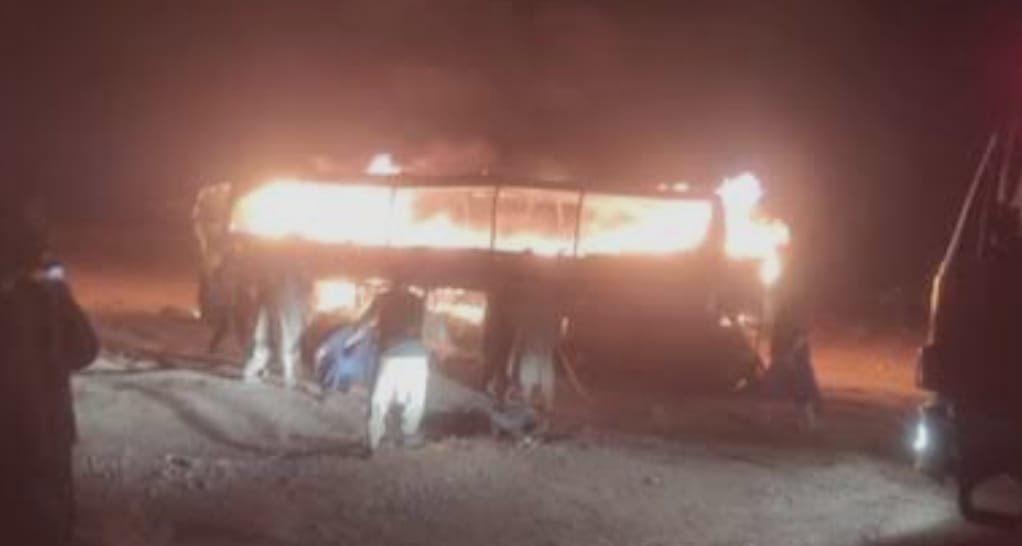
A devastating road accident in western Afghanistan has killed at least 71 people, including 17 children, when a passenger bus caught fire following a collision with a truck and a motorcycle, officials said. The incident took place on Tuesday in Herat province. Local police said the bus, which was carrying Afghan migrants deported from Iran, burst into flames after the impact. “The driver was speeding, and his negligence caused the tragedy,” provincial police said in a statement. Videos circulating on social media showed the bus engulfed in flames as residents rushed to the scene, but few passengers could be rescued. Mohammad Yousuf Zaidi, spokesperson for Herat’s provincial administration, confirmed that all the passengers were Afghan returnees traveling from Islam Qala – a border town with Iran – to Kabul. “They were migrants deported from Iran. Unfortunately, none reached their destination,” he told reporters. The crash comes just a day after Iran’s deputy interior minister, Eskandar Momeni, announced that nearly 800,000 undocumented Afghan migrants would be expelled by next month. Iran has long hosted millions of Afghans fleeing conflict, poverty, and Taliban rule, but Tehran has tightened restrictions in recent years amid economic hardship. Road accidents are frequent in Afghanistan, where poor infrastructure, reckless driving, and overloaded vehicles contribute to high fatality rates. However, Tuesday’s crash is among the deadliest in recent memory, adding to the hardship faced by Afghan families displaced across borders.
Trinamool’s Abhishek Banerjee lays down ground rules ahead of Bengal assembly polls
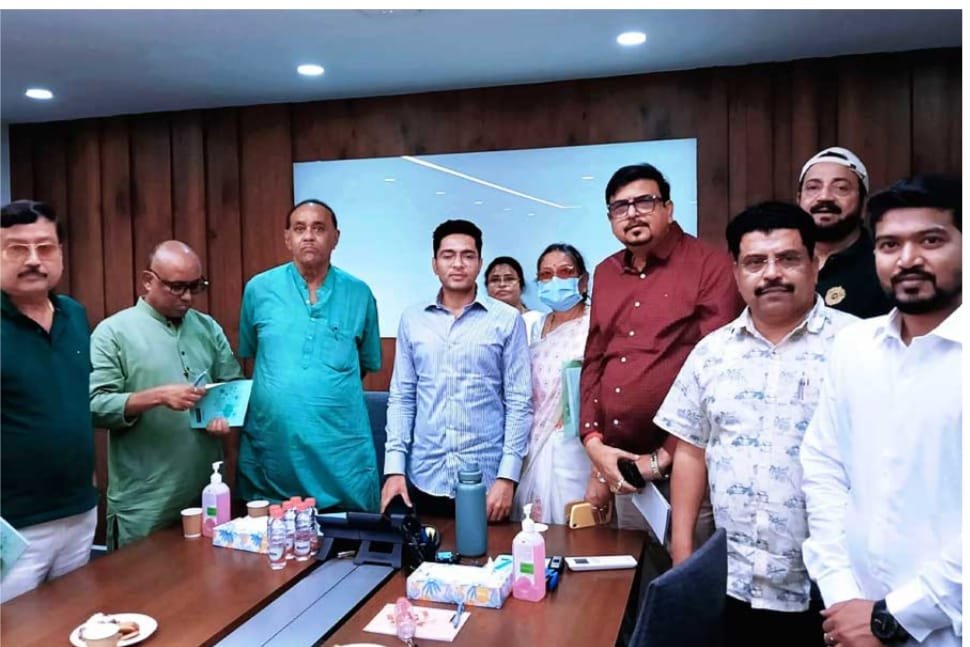
With West Bengal’s assembly elections on the horizon, Trinamool Congress (TMC) national general secretary Abhishek Banerjee is tightening the party’s organizational discipline, holding district-wise review meetings and sending out a clear message: internal unity and grassroots outreach will decide the battle against the Bharatiya Janata Party (BJP). At a meeting with leaders from Barasat and Tamluk on Tuesday, Banerjee stressed generational balance within the party, announcing that leaders above the age of 40 would no longer be part of the youth wing. “If one person holds on to two positions, that is not what the party wants,” he told colleagues, adding that such leaders would instead take up responsibilities in the parent organization. The TMC leader also underscored the need for stronger public engagement. “Factionalism will not be tolerated,” he warned, instructing district leaders to expand outreach at the booth level and maintain constant contact with ordinary citizens. He admitted that the party’s performance in last year’s parliamentary elections was “very poor” but called on cadres to regroup with renewed energy. “In the assembly polls, the BJP must be countered on every front,” Banerjee said, urging elected representatives to remain visible and accessible. In the Tamluk meeting, Banerjee focused on consolidating organizational strength in rural Bengal and paid particular attention to Nandigram — a politically symbolic constituency since Mamata Banerjee’s high-profile contest there in 2021. He also emphasized flagship TMC programs such as Amar Para, Amar Samadhan (My Neighborhood, My Solution), which he said should serve as key tools for local mobilization. By combining the experience of senior leaders with the energy of younger cadres, Banerjee hopes to build a disciplined party machine that can blunt the BJP’s advance in Bengal’s 2026 state polls.






